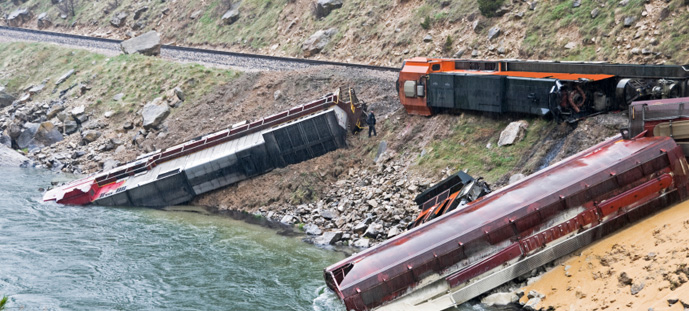Train accidents can be caused by any number of things, including:
- Broken, worn, or malfunctioning rails, which cause the train cars to derail and crash onto cars or pedestrians nearby
- Too much cargo, causing an imbalance of weight or crushing the tracks and causing derailment
- Broken, worn, or malfunctioning train parts, which cause cars to come unhitched or brakes to fail or warning horns not to sound
- Faulty or broken warning lights or gates that fail to prevent pedestrians or drivers from passing in front of a speeding train
- Faulty signals or inattentive conductors which cause trains to crash through areas not clear of people or cars
- Poorly maintained areas around rail tracks, where vegetation has covered warning signals or which detracts from the visibility of any coming train
- Objects or debris on the tracks
And train accidents do not just involve the railroad or railcar. Train accidents can involve:
- Trains colliding into each other
- Trains crashing into cars
- Trains hitting pedestrians
- Trains derailing
- Trains exploding or catching fire, for example.
Railroad crossing accidents involve cars or pedestrians being struck while nearby or when crossing the tracks. These types of accidents seem unlikely, as we think that surely people would see or hear the train coming. Unfortunately, the truth is, these types of accidents are common. But they could and should have been avoided. Often, rail crossing accidents are simply due to:
- Cars parked too close to rail tracks
- Pedestrians walking too close to tracks
- Pedestrians slipping or tripping, causing them to land on the tracks
- Lack of a barrier preventing pedestrians or drivers from getting too close
- Defective signals or gates
- Trains failing to sound the horn or turn on the lights as they approach a station
- Plants or other objects obstructing crossings
- Objects sticking out from the train, for example.
No matter what the cause – whether malfunctioning parts or inattentive conductors or even a true accident like someone slipping under the tracks – any train accident can have enormous and devastating consequences, even when the train is traveling at a slow speed.
Click here to read more about the types of damages caused by rail accidents and possible recovery for victims
This is why the railways of our country are governed by high safety standards – to protect the engineers, passengers, nearby pedestrians and drivers, and all in the surrounding community from any potential harm. But when a rail company has neglected to maintain the railroad tracks, or when a freight train company has not maintained the train cars to ensure they are safely operating, such negligence is unacceptable.
Our attorneys know what questions to ask and how to investigate in order to pinpoint the cause of a railway accident. We work to hold the negligent parties accountable so that you can start to recover from this tragedy and we can prevent such tragedy from happening again. We want to uphold all railway safety rules to ensure our community is safe when trains pass nearby or overhead or through the middle of town.
If you have been injured by a passing train or as a result of any railway accident, or if you have lost a family member due to a collision or wreck, contact us at NB&W today and tell us what happened. We will answer your questions for no charge or obligation. We want to help victims like you hold negligent train companies accountable and we want to help you and your family start to recover.
Help us help keep our community safe.
